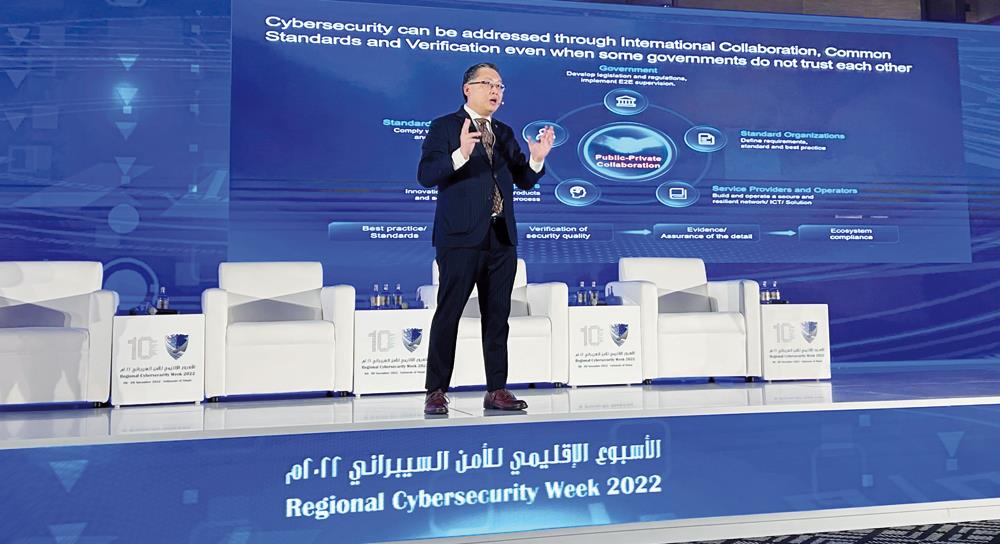(MENAFN- The Peninsula) The Peninsula
Doha: Huawei took part in the Arab Regional Cybersecurity Week 2022 in Muscat, Oman from November 6 - 9, where it advocated for sustained collaboration to secure the digital world.
Huawei called upon Arab nations under the Organisation of Islamic Cooperation (OIC) to implement the OIC-CERT 5G Security Framework where the Network Equipment Security Assurance Scheme (NESAS) standard, the joint GSMA and 3GPP framework for the security evaluation of mobile network equipment shall be the fundamental security baseline.
The Arab Regional Cybersecurity Week 2022 was organised by ITU-Arab Regional Cybersecurity Centre (ITU-ARCC) and hosted by the Oman Ministry of Transport, Communications and Information Technology through Oman National Computer Emergency Response Team (OCERT). It featured a series of co-hosted events, comprising the 10th Arab Regional & OIC-CERT Cyber Drill, the 10th Regional Cybersecurity Summit, the FIRST & ITU-ARCC Regional Symposium for Africa and Arab Regions, the 3rd WiCSME Annual Conference and the 14th Annual Conference of the Organization of The Islamic Cooperation CERT (OIC-CERT), culminating with the 10th Annual Arab Meeting (ACCT) on 10 November 2022.
OIC-CERT held its Global Awarding Ceremony on the sidelines of the event, where Huawei Qatar was awarded the OIC-CERT Global Cybersecurity Award 2022 recognizing its efforts in cybersecurity excellence.
Yang Ming, Head of Cybersecurity at Huawei Middle East, said“the award is a testament by OIC-CERT to Huawei's contribution in cybersecurity innovation. Huawei has always taken cybersecurity as the company's top priority and will continue to be a key contributor to cybersecurity development in OIC-related countries in the future”. The Award is an initiative by the OIC-CERT to encourage international collaboration in the cybersecurity domain. It recognizes innovative cybersecurity projects from around the world, not bound by country or region that contribute to uplifting the OIC community welfare while promoting the digital realm.
Under the theme of“Cybersecurity Innovation and Industry Development”, the event featured a stellar line-up of speakers, case studies, panel discussions and unique presentations that provided access to a wealth of industry-leading knowledge, sharing best practices and experiences, spotlighting trends, information exchange, cutting-edge insights and outlooks with actionable takeaways.
During the event, Aloysius Cheang, Chief Security Officer, Huawei UAE, gave a keynote on the first day titled,“Addressing Cybersecurity Concerns in Emerging Technologies – Challenges and Opportunities”.
He highlighted Huawei's commitment to building and maintaining an open and collaborative environment in the Arab world, where nations are binded together based on Islam as common faith, and therefore the OIC and the OIC-CERT shall be the platform of choice to usher in a new Islamic Golden Age in the Metaverse. Cheang also highlighted Huawei's commitment to the region, with our commercial membership in OIC-CERT and efforts to drive 5G security standardization, emphasizing our localized approach to supporting partners to enhance their network resilience in lieu of 5G and Cloud as critical pillars to embrace rapid digital transformation brought about by the pandemic.
Cheang said,“5G faces security challenges and opportunities brought by new services, architectures and technologies, as well as higher user privacy and protection requirements. The industry needs to understand the requirements of diversified scenarios and better define 5G security standards and technologies to address associated risks.”“NESAS, developed in accordance with security standard guidelines pertaining to vendors' product development and lifecycle processes, provides a security baseline to evidence that network equipment satisfies a series of security requirements. Together with the OIC-CERT 5G Security Framework, it offers a measurable and controlled environment with a Plan-Do-Check-Act guided actions for managing 5G security chaperoning rapid digital transformation needs of Arab nations,” he added.























Comments
No comment